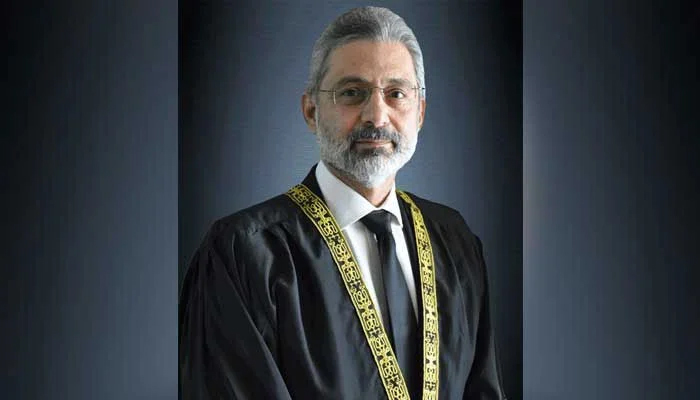Where was Kasuri murder plotted, asks CJP
Justice Sardar Tariq Masood, while raising questions on the procedure of trial, observed that Bhutto’s execution was completely illegal
ISLAMABAD: Chief Justice of Pakistan (CJP) Qazi Faez Isa Tuesday said that Zulfikar Ali Bhutto’s (ZAB) trial was based on a conspiracy to murder, questioning whether the conspiracy was hatched in the Prime Minister House or somewhere else. He said Bhutto was charged with murder, so there should have been some elements of murder in the case.
A nine-member bench of the apex court headed by Chief Justice of Pakistan (CJP) Qazi Faez Isa heard the Presidential Reference filed in 2011, seeking to revisit the murder of ZAB. Other members of the bench include Justice Sardar Tariq Masood, Justice Syed Mansoor Ali Shah, Justice Yahya Afridi, Justice Amin-ud-Din Khan, Justice Jamal Khan Mandokhail, Justice Muhammad Ali Mazhar, Justice Syed Hasan Azhar Rizvi and Justice Musarrat Hilali.
Commencing his arguments, SC’s former judge Manzoor Ahmed Malik, an amicus curie (friend of court), told the court that various illegalities were committed during the trial of former prime minister ZAB and the death sentence awarded to him was the worst example of dishonesty.
He said that on February 2, 1979, a seven-member bench of the Supreme Court by a majority 4-3 dismissed ZAB’s appeal upholding the verdict of Lahore High Court awarding death sentence to Bhutto while three other judges had accepted his appeal.
The former judge, while assisting the court on criminal aspect of the case, submitted that the death penalty decision of ZAB was the worst example of dishonesty.
Justice (retd) Malik suggested the court to make it mandatory for the lawyers registered with the Supreme Court to read ZAB death sentence case as the case was not accepted as a reference in any court, so no one reads it.
“By reading this case one will know as to how the law has been mocked,” Malik submitted.
He submitted that the head of the five-member bench of high court that tried the Nawab Ahmad Khan murder case, the-then acting Chief Justice Maulvi Mushtaq Hussain expressed personal grudge against ZAB and had also made it a part of the order but did not recuse from the bench.
“Sitting on the bench despite personal grudge is not prejudice but is something above malice,” the amicus curie contended, adding that the other four judges who signed the order also should not have sat on the bench.
He submitted that judges sat on the bench to punish ZAB. The former judge further submitted that during the trial, a mockery of the law was made, adding that based on these reasons people called Bhutto’s death sentence as judicial murder.
Justice Sardar Tariq Masood, while raising questions on the procedure of trial, observed that Bhutto’s execution was completely illegal, adding that the personal grudge against the trial court’s order is evident.
Chief Justice Qazi Faez Isa observed that if the murder was based on conspiracy, then ZAB should not have been charged with murder.
To a question, Malik submitted that the trial of the crime punishable by death cannot be done in the high court, adding that it is mandatory to go to high court and confirm the death sentence from the high court.
In the Bhutto case, the amicus curie contended, the death sentence was not confirmed by the high court. He submitted that India is five times larger in size of our country, but there is not a single example of a trial in the high court.
“It is not only the right of accused to appeal to the high court against the decision of trial court, but it is also the duty of judges to give the right to appeal,” Malik submitted.
Justice Mansoor Ali Shah observed that there is another difference between India and us i.e. there is no martial law there.
The amicus curiae submitted that the case under consideration had two aspects of Article 186 of the Constitution as well as interpretation and the second death sentence decision.
“The death sentence decision is related to the facts, so it should be imagined that I am giving arguments before the court in the appeal,” Justice (retd) Malik submitted, adding that the incident took place on the night of November 10 and 11, 1974 at Shadman Chowk, Lahore, and an FIR was registered at the Ichra Police Station.
Malik submitted that Ahmed Raza Kasuri, the son of deceased, did not name anyone as an accused, but the initial statement mentioned political rivalry with ZAB. After the investigation, the case was entered into the office in October 1976 by the order of the magistrate, and after being marshaled, the investigation was restarted without any written order and on September 11, 1977, ZAB was presented an incomplete challan.
He submitted that seven accused were named, adding that accused Ghulam Hussain and Masood Mahmood were pardoned by making them witnesses and on September 18, 1977, the names of the two mentioned persons were removed by presenting a complete challan, while all the other five persons, including ZAB, were tried and sentenced to death.
Malik submitted that that Zulfikar Ali Bhutto was accused of conspiracy to murder even though the complainant did not mention any conspiracy. “The re-examination without revoking the order of magistrate to register the case was illegal,” he submitted, adding that reinvestigation was permissible but following due process of law.
The amicus curie submitted that it showed malpractice as no one had challenged the magistrate’s order.
Justice Yahya Afridi inquired that when the matter goes to trial, had the magistrate’s order not expired? Malik replied that a judicial order was necessary.
Justice Musrat Hilali inquired how the re-investigation was started in the case.
The amicus curie submitted that the FIA was investigating the Federal Security Force (FSF) during which the investigation of the murder case was also started. He submitted that the legal procedure of transferring the investigation was not adopted, adding that the co-accused Sufi Ghulam Mustafa, Iftikhar and Arshad Iqbal confessed to the crime and they were also hanged.
He further submitted that the co-accused had said that he killed the deceased at the behest of Mian Muhammad Abbas and Ghulam Hussain. “After this confession, there was no case against Bhutto,” Malik submitted, adding that the death sentence of five people in one murder was illegal.
He further submitted that the incomplete murder case was filed in the magistrate’s court and the magistrate sent it to the sessions court the same day, while the request to transfer the case to high court for trial was received the next day,
The amicus curie submitted that Molvi Mushtaq Hussain, without giving notice to the parties, approved the application, and the record of the case was called. He further submitted that the case was transferred from the sessions court to high court without stating the objects and reasons in the order and the objection request against the judge was also rejected.
To a court query, the amicus curie submitted that the judges who heard the complainant’s request were not included in the bench because one of the judges, Justice Samdani, had granted bail to ZAB. “Malpractice is seen floating above in this case,” the amicus curie submitted, adding that there was no record as what was decided on the request of Ahmed Raza Kasuri.
The former SC judge submitted that there was no greater malpractice than the manner in which the case was transferred and the trial was conducted. He submitted that in criminal cases, it is mandatory to form the opinion of the judge, but the trial started without forming the opinion, adding that witnesses were called, neither the accused, his lawyer, nor the record of case were called, but the court decided to trial and this was beyond the violation of law.
He submitted that a tribunal was also formed to inquire into the matter and Ahmed Raza Kasuri came forward and stated that it was not possible that Bhutto was behind his father’s murder. Justice Hilali inquired whether any statement of the complainant of the case was recorded.
Malik said Kasuri had gone back to the Pakistan Peoples Party in 1977 and was also asking for a ticket, praising Bhutto, but he did not get the ticket.
Justice Hilali further asked as to when the complaint was filed again. Malik said that there was no record, and the case was restarted after martial law.
Present in the courtroom, Ahmed Raza Kasuri said that the reputation of judges who heard the ZAB case in the Supreme Court was in danger, adding that it seemed those judges who heard the Bhutto case were on trial, adding that those judges were not alive, however, their families were present. He requested the court that notices be issued to make the families of those judges parties. Kasuri said the eminent judges of Supreme Court of that time are being presented in a negative way.
Justice Isa said they were not holding trial of anyone and were hearing the Presidential Reference under the Constitution. The court’s proceedings were being telecast live and were reported in detail in the media, so if anyone has to say something, he may come and say it. Justice Sardar Tariq Masood, however, asked Kasuri that if he felt something was wrong, he could defend those judges on his turn.
Meanwhile, the court adjourned the hearing till 11:30 today (Wednesday).
-
 Cancer-stricken King Charles At Breaking Point?
Cancer-stricken King Charles At Breaking Point? -
 Andrew Leaves King Charles No More Moves To Play: ‘Can’t Just Say We Got Nothing’
Andrew Leaves King Charles No More Moves To Play: ‘Can’t Just Say We Got Nothing’ -
 Sterling K. Brown Explains How Sharing His Kids' Photos On Social Media Can Keep Them Safe
Sterling K. Brown Explains How Sharing His Kids' Photos On Social Media Can Keep Them Safe -
 Keir Starmer Gives Major Advise To King Charles Amid Andrew Scandal
Keir Starmer Gives Major Advise To King Charles Amid Andrew Scandal -
 Nick Reiner Pleads Not Guilty In Famous Parents' Double Murder Which Shocked The World
Nick Reiner Pleads Not Guilty In Famous Parents' Double Murder Which Shocked The World -
 Benicio Del Toro On Losing Mom In Chldhood: 'I’m Still Dealing With It'
Benicio Del Toro On Losing Mom In Chldhood: 'I’m Still Dealing With It' -
 More Than 500,000 Without Power As Blizzard Hits US Northeast
More Than 500,000 Without Power As Blizzard Hits US Northeast -
 Winona Ryder Lands Secret Role In 'Wednesday' Season Three, Marking Reunion With Tim Burton
Winona Ryder Lands Secret Role In 'Wednesday' Season Three, Marking Reunion With Tim Burton -
 Andrew, Fergie’s Life Without The Bells And Whistles Turns Grimmer: ‘A Lot More Was Happening’
Andrew, Fergie’s Life Without The Bells And Whistles Turns Grimmer: ‘A Lot More Was Happening’ -
 Nicole Kidman And Keith Urban's Divorce Drama Deepens As Teen Daughters 'stick' By Their Mother's Side
Nicole Kidman And Keith Urban's Divorce Drama Deepens As Teen Daughters 'stick' By Their Mother's Side -
 William, Kate Desperate To Make Public Statement Distancing Themselves From Andrew
William, Kate Desperate To Make Public Statement Distancing Themselves From Andrew -
 Charli Xcx Details Boozy Second Wedding To The 1975's George Daniel: 'Everyone Was Hungover'
Charli Xcx Details Boozy Second Wedding To The 1975's George Daniel: 'Everyone Was Hungover' -
 Gracie Abrams Follows 'Kylie Jenner Playbook' With Paul Mescal Romance
Gracie Abrams Follows 'Kylie Jenner Playbook' With Paul Mescal Romance -
 Dua Lipa Shares 'Love Letter' With New Boyfriend After Emily Ratajkowski Confirms Romance With Her Previous Beau
Dua Lipa Shares 'Love Letter' With New Boyfriend After Emily Ratajkowski Confirms Romance With Her Previous Beau -
 Brazilian Beauty Influencer Passes Away After Suffering 'medical Emergency'
Brazilian Beauty Influencer Passes Away After Suffering 'medical Emergency' -
 Sarah Ferguson Turns Into A Bulldozer With Beatrice, Eugenie: ‘Help Me Out’
Sarah Ferguson Turns Into A Bulldozer With Beatrice, Eugenie: ‘Help Me Out’




